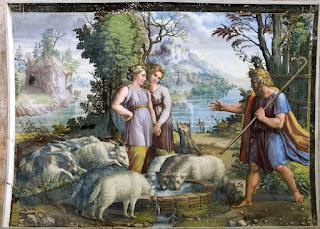Parashat Miketz (Shabbat Rosh Chodesh)
Torah: Genesis 41:1 - 44:17 (Aliyot 1-6)
Shabbat Rosh Chodesh: Numbers 28:9-15 (Aliyah 7)
Maftir: Numbers 7:42-47 (Shabbat Hanukkah)
Haftarah: Zechariah 2:14 - 4:7 (Shabbat Hanukkah); Sephardim add: Isaiah 66:1, 23 (Rosh Chodesh) and 1 Samuel 20:18, 42 (Machar Chodesh)
This d'var torah is offered for a refuah shleimah for Feigel bat Kreina and D'vorah bat Feigel.
https://drive.google.com/file/d/1Jt-NLamlIiAGpBhU7WNrCVZGBYhHHWCN/view?usp=sharing
On December 7, we’ll be continuing from the last paragraph of page 27, "Daber na b'oznai ha'am" - "Speak, please, in the ears of the people".
Check out our wonderful community, and get lots of info about becoming a Chaver and our various programs, at:
https://bnaihayim.org/
Rabbi Van Leeuwen has a blog which you should read at:
https://rebjasonblog.wordpress.com/blog/
--------------------------------------------------------------------------------
REPENTANCE, REDEMPTION AND FORGIVENESS
"And Joseph said to them, 'This is what I spoke to you, saying, you are spies.'" Genesis 42:14
The sons of Jacob are put to the test. In order to demonstrate that they are not spies, they must bring Joseph's full brother, Benjamin, before the viceroy of Egypt (who, unbeknownst to them, is Joseph). He puts them in the same position, vis-a-vis Benjamin, that they were in regarding Joseph, when they abandoned him in the pit.
Nechama Leibowitz suggests that this is also a test of whether they have done teshuvah - to see if they have repented of what they did to Joseph. She cites Maimonides, who teaches that the test of true repentance is whether, given the opportunity to commit the same sin, the sinner refrains - out of repentance, rather than fear or weakness.
The brothers agree to the demand. But another aspect of teshuvah is admission - one must acknowledge and accept responsibility for the transgression. This they do, at verse 21, when "They said to each other, 'We are being punished on account of our brother, for we saw the anguish of his soul as he pleaded with us, and we would not hear.'" According to Rabbi David of Lilov, only then did their redemption begin - only then did God fill Joseph's heart with love and mercy.
Perhaps only then was Joseph able to forgive them. Repentance is a multi-step process. Neither words nor deeds alone suffice. The same is true of forgiveness. Ultimately, Joseph forgives not with mere words, but with hugs and kisses and gifts and acceptance - and reunion. It leads to one of the happiest scenes in the Torah. Try repenting for the hurt you've given others - try forgiving for the hurt you've endured. Hear the anguish of another's soul. You have nothing to lose but your unhappiness.
Shabbat Shalom! Chag Urim Sameach!
הַלּוֹמֵד מִכָּל אָדָם ?אֵיזֶהוּ חָכָם
Ben Zoma - Pirkei Avot 4:1
-----------------------------------------------
Cyber Torah list management (no salesman will call!):
To subscribe to Cyber Torah, send an e-mail with the subject heading “Subscribe Cyber Torah” to: ravflom@sbcglobal.net
Send requests for dedications of Cyber Torah in honor of a simchah, in memory of a loved one or for a refuah shleimah to: ravflom@sbcglobal.net
To unsubscribe from Cyber Torah, send an e-mail with the subject heading “Unsubscribe Cyber Torah” to: ravflom@sbcglobal.net







